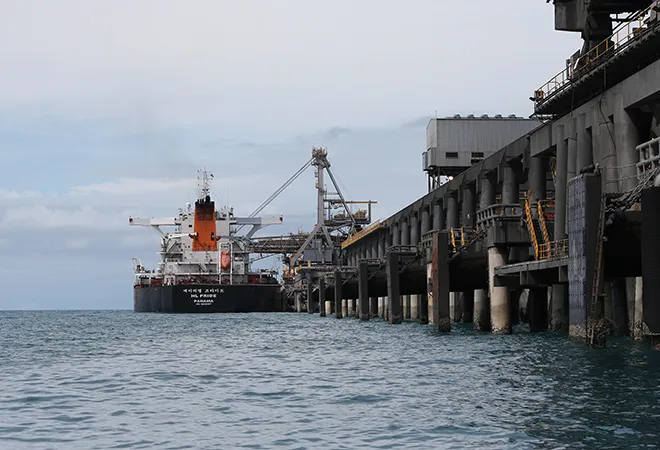
What constitutes a sustainable economic relationship, and why has it been such a challenge for Australia and India to convert their often-quoted complementarities into effective economic engagement? As strategic bilateral ties see new alignments and commitments, can economic ties reflect the same fervor?
The answers to these questions depend on two critical components—intent and action. It is in this context that the month of September was a pleasant departure from the monotony of promises to an outcome-led vision towards partnering for prosperity. It also provided a much-needed ballast to the economic relationship that has yet to secure the breadth and gravitas of the government-to-government relationship. Well-established business interests would provide a vital balance that Australia does not, as yet, have with India. Australian and Indian businesses are under-invested in each other.
The publicly announced intent by the trade ministers of both countries, to deliver an interim/Early Harvest Agreement by December this year, and a full-fledged Comprehensive Economic Cooperation Agreement (CECA/FTA) by end of 2022. Australian Trade Minister Dan Tehan declared that it’s an extraordinarily ambitious day, aimed towards creating a win-win economic partnership that’s balanced and reciprocal. The aggressive timelines for the deal are a strong indication towards achieving time-bound outcomes on the trade partnership.
This was followed by the Australia India Business Exchange (AIBX) that brought several Australian and Indian companies across the healthcare, mining, infrastructure, agrifood, and education sector together, on a virtual platform showcasing their offerings and capabilities. Led by an underlying vision of aligning Australia’s sectoral strengths with India’s rising aspirations.
India’s electric mobility, renewables, and advanced manufacturing ambitions are generating strong demand for critical minerals and rare earth. With India’s New Education Policy, significant skills demand and growth in India’s education technology industry has opened up opportunities for Australian companies to partner on transnational education, content, product development, and scale-up. A proliferation of urban modernisation schemes in India is driving demand for sustainable building infrastructure, sustainable energy, and integrated water management capabilities. Australian METS innovation can support mining productivity and efficiency in India. The Post-COVID health crisis has initiated opportunities in the digital healthcare revolution in India, where Australia has existing capabilities in telehealth and virtual health services, AI, interoperability, health informatics, digital therapeutics and diagnostics, data analytics, precision medicine, and e-prescriptions.
Well-established business interests would provide a vital balance that Australia does not, as yet, have with India. Australian and Indian businesses are under-invested in each other.
In a post-COVID-19 world, businesses are conscious that they will need to think carefully about how they balance resilience and cost-effectiveness, as well as how they keep up with emerging technologies that are driving transformation. These digital technologies could also play a transformative role in the bilateral business relationship if Australian innovation can be combined with Indian industry partners in manufacturing, mining technology and energy, health, cybersecurity, agrifood, and education. The potential of the ‘powerhouse concept’, where countries combine their comparative advantages to create new competitive advantages, ultimately to also sell in third countries is distinctly open for Australia and India.
The month of September also saw the announcement of the opening of Australia’s international borders that has remained closed for the past 18 months, giving Australia an infamous tag of ‘Fortress Australia’; Australia’s Therapeutics Goods Association (TGA) recognition of the Covishield vaccine for incoming travellers from India; and two of Australia’s big companies making their India market entry.
Blackmores (ASX: BKL), Australia’s leading ASX 200 health supplements company with a market capitalisation of US $1.8 billion that operates in 12 other markets across Asia-Pacific and has an ambition to connect 1 billion consumers globally to the healing power of nature by 2025, announced its launch into the Indian market. They aim to reach local consumers in association with Amazon India and other major ecommerce platforms before expansion to traditional retail in key cities.
Australia’s second largest buy-now-pay-later (BNPL) firm Zip Co Ltd decided to test the waters in the Indian market via a strategic investment of A$69 million in Indian peer ZestMoney—a leading Fin-tech company with 11 million registered users, in Bengaluru.
Keen on tapping India’s clean energy market and future hydrogen economy, JSW Future Energy, a wholly-owned subsidiary of JSW Energy, has entered into an agreement with Australian Fortescue Future Industries, a 100 percent renewable green energy and industry company of Fortescue Metals Group. Both companies will jointly conduct scoping work for green hydrogen production-related projects for use in green steelmaking, hydrogen mobility, green ammonia, and other mutually agreed industrial applications in India. Australia and India has also agreed to a new low emissions technology partnership, a partnership that will focus on hydrogen development, ultra-low-cost solar programmes to support the energy transition and technology transfer from developed to developing economies.
The potential of the ‘powerhouse concept’, where countries combine their comparative advantages to create new competitive advantages, ultimately to also sell in third countries is distinctly open for Australia and India.
It clearly appears that the ‘New Normal’ diplomacy narrative between Australia and India, is aware that it must be entrepreneurial, creative, and be led by a nuanced understanding of dynamic factors like consumerism, capability, and capacity. No surprise, for Minister Tehan to alternate the 3C’s of cricket, curry and Commonwealth with critical minerals, clean energy, and CECA.
What’s next?
Like any trade deal, governments can open the door, but it is up to business to find the courage to walk through it and do the hard work required to develop the strategy to identify and capitalise on opportunities, build relationships, make careful choices of partners, understand the changing consumer market for any product or service they are interested in, be aware of demographic shifts, new regulations and changing domestic government priorities. Post-COVID economic recovery will depend on Australian and Indian businesses capability to finding shared values and partnerships that meet mutual needs.
A changed business approach, and willingness to understand India’s development priorities will be key to pursuing opportunities. For instance, the nature of bilateral economic ties between India and Japan, India and Germany are led by capacity building, development cooperation, and creating an enabling ecosystem, where these countries have looked at building capacities and doing business as a singular goal. These bilateral ties are informed by in-depth policy and economic understanding of dynamic India’s growth story that sits at the intersection of policy, finance, technology, and governance. For instance, Japan is regarded as India’s trusted partner in India’s infrastructure and economic transformation goals. It has made substantial investments in India’s landmark infrastructure projects. Germany’s development cooperation with India focuses on energy and energy efficiency, sustainable urban development, and environmental and resource protection, etc.
Australia needs to invent this ‘holistic partnership story’ for India, as it looks to position itself in the market. An issue-based engagement that is aware of all the relevant stakeholders in the value chain. For instance, a dialogue around Electric Vehicles (EV) would include critical minerals explorers, miners, processors, researchers, innovation, investors, manufacturers, federal and state regulators, and peak industry bodies.
Fear of failure, scepticism, complex, too huge to handle, bureaucratic are few rampant Australian business sentiments around doing business in India. Understandably, the operating environment in India is not straightforward, with multiple agencies, institutions, and networks, however it is equally prudent to recognise that businesses from many other countries, including in Europe and North America, enjoy considerable success in India.
The nature of bilateral economic ties between India and Japan, India and Germany are led by capacity building, development cooperation, and creating an enabling ecosystem, where these countries have looked at building capacities and doing business as a singular goal.
The twin impacts of geopolitical tensions and COVID-19 has exposed the weakness of the Australian trading economy, hence being agile with change and shedding off old reservations is the best option available for economic recovery and to secure new growth opportunities to support long-term economic security.
From a business perspective, there is little awareness of Australian companies that are doing well in India. It is equally pertinent to create these cultural and business reference points, for attitudes to shift and trust to be built. The author is currently working towards a ‘Business Case Studies Compendium’ to inform on these sectoral successes. Australian businesses must also focus on securing the large skilled talent within Australia’s Indian diaspora that’s rich in their knowledge about India and networks to capitalise on the India growth story and market access.
The recent new energy in bilateral ties can be a successful precursor to an outcome-led effective economic engagement, building a fact-based realistic narrative on evolving India, informing businesses of sectoral structural and economic reforms, as well as actioning rising opportunities.
The views expressed above belong to the author(s). ORF research and analyses now available on Telegram! Click here to access our curated content — blogs, longforms and interviews.




 PREV
PREV


